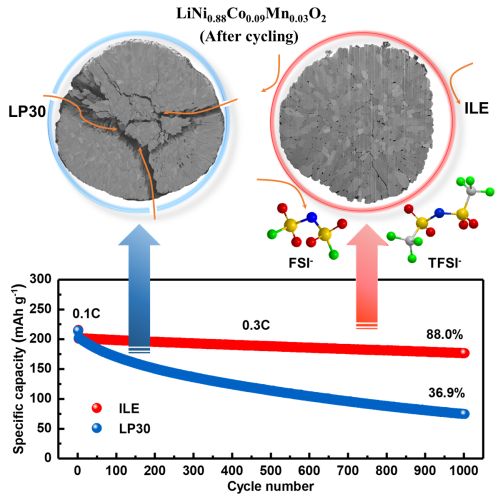
August 25th, 2021
The German-French Research Project MOLIBE at HIU is on the way to a completely solid, metal-free rechargeable Battery has reached an important intermediate step: The scientists have successfully developed organic full cells that run stably for several hundred cycles.
In order for the energy turnaround to succeed, renewable energies and power grids need to be expanded – but also sustainable and safe energy storage systems. Lithium-ion batteries are considered to be the most promising technology for reversible energy storage, but are currently still too expensive and unsafe for widespread use. The high costs arise from the use of metals such as cobalt, nickel or lithium copper. The safety concerns apply to the easy flammability and the low stability of the liquid electrolytes.
The MOLIBE project funded by the Federal Ministry of Education and Research (BMBF) is therefore working on completely solid, metal-free, rechargeable batteries made from organic active materials and polymer electrolyte systems. The researchers have now achieved their first major success: They have developed organic full cells that run stably for several hundred cycles, but which still contain Li ions. One of the two half-cells developed is even stable for over 5,000 cycles.
The efficient and sustainable synthesis process for the active materials is an important building block for a possible commercialization of the technology. The French project partner CEA is therefore already planning a patent application for the process.
The next steps of the project are already being planned: The scientists want to introduce a new polymer electrolyte developed by the project. You want to increase the cell voltage to greater than 2.0 volts in order to increase the energy density and replace the Li ions with less critical metal ions such as sodium or, ideally, even with non-metallic ions.
Further information & links
https://www.fona.de/de/themen/leitinitiative-energiewende.php
12. August 2021
Nickel-rich cathode and ionic liquid electrolyte enable extremely high energy density with good stability – researchers report in Joule magazine
A new type of lithium metal battery offers an extremely high energy density of 560 watt hours per kilogram with remarkably good stability. For this purpose, researchers at the Helmholtz Institute Ulm (HIU), founded by the Karlsruhe Institute of Technology (KIT) in cooperation with the University of Ulm, have used a promising combination of cathode and electrolyte: the nickel-rich cathode allows a lot of energy per mass to be stored, the ionic liquid electrolyte ensures that the capacity is largely retained over many charging cycles. The team reported on the record-breaking lithium metal battery in Joule magazine (DOI: 10.1016/j.joule.2021.06.014).
Rekordverdächtige #Lithium-Metall-#Batterie. Nickelreiche Kathode und ionischer Flüssigelektrolyt ermöglichen extrem hohe #Energiedichte bei guter Stabilität – Forschende des @KITKarlsruhe und @HelmholtzUlm berichten im Magazin @Joule_CP
https://t.co/fM1pMChdJq— idw Nachrichten (@idw_online_de) August 12, 2021
Lithium-ion batteries are currently the most common solution for mobile power supply. However, the technology reaches its limits when it comes to certain requirements. This is especially true for electromobility, where light, compact vehicles with long ranges are in demand. Lithium metal batteries are an alternative: They are characterized by a high energy density, which means that they store a lot of energy per mass or volume. But their stability poses a challenge – because the electrode materials react with common electrolyte systems.

Researchers at the Karlsruhe Institute of Technology (KIT) and the Helmholtz Institute Ulm – Electrochemical Energy Storage (HIU) have now found a solution. As you report in Joule magazine, you are using a promising new combination of materials. They use a low-cobalt, nickel-rich layered cathode (NCM88). This offers a high energy density. With the commonly used commercially available organic electrolyte (LP30), however, the stability leaves a lot to be desired. The storage capacity decreases as the number of charging cycles increases. Why this is so, explains Professor Stefano Passerini, Director of the HIU and head of the battery electrochemistry research group: “In the LP30 electrolyte, particle cracks occur on the cathode. The electrolyte reacts within these cracks and destroys the structure. In addition, a thick, moss-like lithium-containing layer forms on the cathode. ”The researchers therefore used a non-volatile, non-flammable ionic liquid electrolyte with two anions (ILE) instead. “With the help of the ILE, the structural changes in the nickel-rich cathode can be significantly reduced,” reports Dr. Guk-Tae Kim from the Battery Electrochemistry Research Group at HIU.
88 percent capacity retained over 1,000 charge cycles
The results: With the cathode NCM88 and the electrolyte ILE, the lithium metal battery achieves an energy density of 560 watt hours per kilogram (Wh / kg). It initially has a storage capacity of 214 mAh per gram (mAh / g); 88 percent of the capacity is retained over 1,000 charging cycles. The Coulomb efficiency, which indicates the ratio between withdrawn and supplied capacity, averages 99.94 percent. Since the presented battery is also characterized by a high level of safety, the researchers from Karlsruhe and Ulm have thus taken an important step on the way to carbon-neutral mobility.
Original publication (Open Access)
Fanglin Wu, Shan Fang, Matthias Kuenzel, Angelo Mullaliu, Jae-Kwang Kim, Xinpei Gao, Thomas Diemant, Guk-Tae Kim, and Stefano Passerini: Dual-anion ionic liquid electrolyte enables stable Ni-rich cathodes in lithium-metal batteries. Joule. Cell Press, 2021. DOI: 10.1016/j.joule.2021.06.014
Further Information
https://doi.org/10.1016/j.joule.2021.06.014
https://www.kit.edu/kit/pi_2021_075_rekordverdachtige-lithium-metall-batterie.php
July 28th, 2021
The Battery Cluster of Excellence “Post Lithium Storage” hosted the first international, virtual workshop on “Post-Lithium Research: Women in Focus” on July 27th and 28th. A number of HIU scientists were among the organizers of the workshop (Montaha Anjass, Sonia Dsoke, Christine Kranz and Ijaz Mohsin) as well as among the participants.
The aim of the workshop was to highlight the role of women in modern post-lithium energy storage research. Although there has been visible progress in gender equality research in recent years, women are still underrepresented in STEM subjects and their research is often given less attention than their male counterparts. This is particularly evident in the filling of managerial positions. The interest of many researchers in this topic was shown by the high number of participants of around 220. Numerous outstanding, international scientists in the field of Post-Li research took part in the workshop. For the first time worldwide, an event on battery research placed a special focus on the work of women scientists.
Our workshop “Post-Lithium Research: Women in Focus” has just started with the first talk by Prof. Kristina Edström @KristinaEdstrm2, who is talking about post-lithium batteries in the EU project @2030Battery+. pic.twitter.com/vpkAgK2pYI
— POLiS_Cluster (@ClusterPolis) July 27, 2021
15 invited scientists showed a wide range of topics, from basic materials and electrolyte research to advanced characterization and applications. Renowned plenary speakers such as Kristina Edström (Uppsala University), Clare Gray (University of Cambridge), Montserrat Casas Cabanas (CIC energiGUNE) or Maria Rosa Palacín (Institut de Ciència de Materials de Barcelona) gave insights into their very different scientific careers – all of them outstanding role models for young scientists.
In addition to the lecture program, there was a digital poster session with a total of 28 contributions. The posters by Clarissa Glaser and Luca Schneider, both doctoral students in the Cluster of Excellence, were awarded the Best Poster Award. Clarissa Glaser deals with the “Investigation of MgZ2Se4 (Z = Sc, Er, Tm, Y) Spinels as Mg Ion Conductors for All Solid State Mg Batteries” and Luca Schneider’s poster has the topic “Cathode Tortuosity: Porous Nanostructured vs. Bulk Particles”.
Further Links:
July 26th, 2021
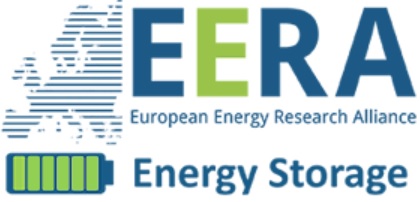
HIU director Passerini coordinates new European research project
As the largest European energy research association, the European Energy Research Alliance (EERA) was able to set another milestone in the direction of “climate neutrality”.
Under the coordination of HIU director Prof. Dr. Stefano Passerini the research project “Storage Research Infrastructure Eco-System” (StoRIES) is now set up. StoRIES will officially start on November 1st, 2021. The project is an importnant element of the “EERA Joint Program Energy Storage (JPES)”. “From StoRIES we expect a functioning ecosystem in which we can get to market-ready storage solutions more quickly. Scientists with different research focuses are working in this innovative ecosystem together with the industry on hybrid energy storage technologies that correspond to the new environmental policy framework”, coordinator Passerini said.
? The @EU_Commission has adopted today the #Fitfor55 Package, a set of proposals to make the EU’s climate, #energy, land use, transport, and taxation policies fit for reducing net greenhouse gas emissions by at least 55% by 2030.
Learn more here: https://t.co/XEVvTJ2YV8 pic.twitter.com/gwRFztyuTH
— EERA (@EERA_SET) July 14, 2021
Energy storage systems are essential for the energy transition in order to regulate the fluctuations in renewable energies or to absorb excess energy, keep it ready and feed it back into the grid when it is needed again. “Unfortunately, there is not a single storage technology today that is up to this challenge on its own and at the same time offers ideal performance, sustainability and costs,” says Dr. Myriam Gil Bardají , JPES manager since 2015. The program manager rather sees a combination of different energy storage technologies (electrochemical, chemical, thermal, mechanical and electrical storage) as necessary in order to provide the expected performance in terms of capacity and the to offer the desired flexibility. “The EERA-JPES is the first pan-European program that brings together all the important areas of energy storage research and has thus made the StoRIES project possible,” says Gil Bardají.
The StoRIES project aims to bring together cross-research scientific institutions such as technology institutes and universities with industrial partners in order to jointly develop storage solutions for new technology markets. The focus is on interdisciplinary cooperation: “The merging of know-how within science and industry opens up synergies that are often underestimated,” says Passerini. “At the same time, we would like to focus research on energy storage systems more holistically and add socio-technical and ecological aspects. With the European Green Deal 2050, politicians are giving us an immense homework that we can only do together.”
Since the recently passed European Green Deal, there has been a high level of pressure of expectation with regard to innovative energy storage technologies in the European Union. A number of political initiatives are already aimed at making the European Union climate-neutral by 2050.
The most important technological goal of StoRIES is the development of future energy storage systems of all kinds. According to Passerini, these innovations can only be advanced through shared access to first-class research infrastructures and services. The focus of research is therefore aimed at improving material properties for mobile applications and optimizing hybrid energy systems. “A system of modern supercomputers, automation technologies and the use of artificial intelligence allow targeted and accelerated material development for devices. These “accelerated material development platforms” make devices more powerful, more sustainable and more cost-effective. The desired goal is to shorten the development times for new technologies by a factor of 10 and to bring new innovations to the market faster so that renewable energy technologies can become competitive more quickly ”, says Dr. Holger Ihssen from the Brussels office of the Helmholtz Association.
In addition, StoRIES focuses on the analysis of socio-technical and ecological aspects of the storage technologies of tomorrow. In order to promote interdisciplinary scientific work, StoRIES also offers training for companies and universities as well as courses for young scientists who are supposed to develop the innovative hybrid solutions of the future.
In order to sustainably pursue the project beyond four years and to give the idea of interdisciplinary cooperation for the further development of hybrid storage technologies a future, it is necessary not only to establish a stable network of scientists and industry representatives, but also to take on the new task Generation of researchers and technicians.
StoRIES therefore intends to enrich the purely technical training around energy storage systems with ecological, legal, economic and social aspects. Because in order to enable the energy transition or the European Green Deal, not only new technologies are required, but also an understanding of non-technical aspects, such as public approval, the legal framework and the economic efficiency required for the application of the new solutions by industry are crucial.
StoRIES offers a comprehensive program that provides from master’s students to existing academic and industrial employees the knowledge about storage technologies, hybridization, sustainability and impact aspects, which serve as a guide to understand the needs of the stakeholders and future challenges and needs of energy storage as Identify part of a network. “Only with an interdisciplinary approach is it possible to overcome “silos” of individual, often very technical and often closed research areas and to expand understanding and cooperation, “emphasized Dr. Olga Suminska-Ebersoldt.
Are you interested in learning what was discussed during EERA JP Energy Storage “Materials for Hybrid Energy Storage – Creating an Ecosystem for Innovation” webinar?
The webinar’s report, presentations and recording are now available. Access them here: https://t.co/Mzxh2qHOsN pic.twitter.com/QYTUCYKW6h
— EERA (@EERA_SET) April 22, 2021
An international exchange program is intended to give European experts the opportunity to expand the existing research infrastructures.
The new storage technologies must ensure more flexibility and balance in the grid, provide a replacement for intermittent renewable energies and contribute to seasonal challenges in energy storage. The greatest challenge for the development of energy storage systems is primarily the economic aspect.
StoRIES in numbers
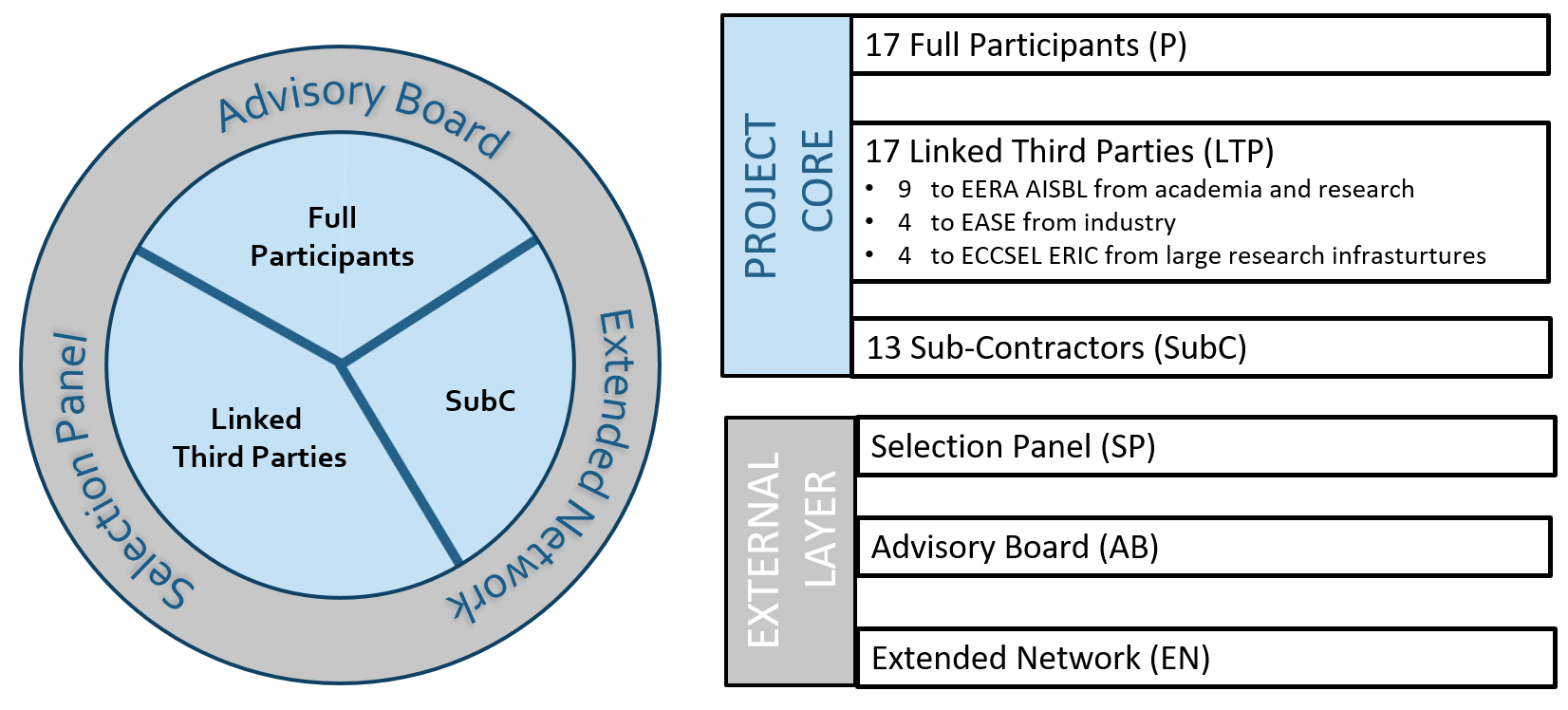
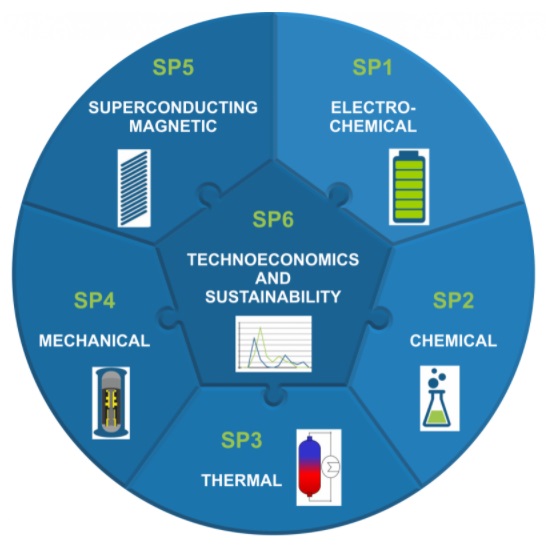
The existing joint energy storage roadmap von EASE and EERA is being expanded with the aim of optimizing the expansion and networking of research infrastructures to promote short-term innovations. Last but not least, the StoRIES project has set itself the goal of building the ecosystem of international partners from research and industry in order to make the science of energy storage more open-ended.
European Energy Research Alliance (EERA)
The European Energy Research Alliance (EERA) is the largest energy community in Europe with 251 participating organizations and over 50,000 researchers in 30 countries. Organized in 18 joint research programs, EERA coordinates energy research to achieve more efficient and cost-effective low-carbon energy technologies. The community is an association of European public research centers and universities. EERA covers the entire spectrum of low-carbon energy technologies and systematic topics.
Joint EERA Programs
EERA members actively collaborate in 18 joint research programs (the EERA Joint Programs), building on national research initiatives, and working on common priorities and research projects. The EERA programs act as mediators for cross-organizational and cross-institutional cooperation, help to avoid duplication of work and to achieve the common goals defined in the SET plan.
EERA
The aim of EERA is to accelerate European energy research. All EERA activities contribute to the overarching goal of promoting European energy research. The goals of the EU Strategic Energy Technology Plan (SET-Plan) and the strategy for a clean energy transition are the guiding principles. EERA brings together around 250 research organizations across Europe to promote cooperation and the definition of common goals and to coordinate national research efforts .
Related Links:
https://www.eera-set.eu/
https://www.youtube.com/watch?v=KLDk2_cyZGc/
https://www.eera-energystorage.eu/stories.html
https://ease-storage.eu/wp-content/uploads/2017/10/EASE-EERA-Storage-Technology-Development-Roadmap-2017-HR.pdf
https://hiu-batteries.de/forschung/drittmittelprojekte/eera/
July 27th, 2021
Battery researcher Dr. Matthias Künzel, scientist at the HIU and member of the research group Electrochemistry for Batteries, was recently awarded two research prizes. Last month he was awarded the Ecology Prize of the Viktor-und-Sigrid-Dulger Foundation issued by the Heidelberg Academy of Sciences. On July 27th, the Gips-Schüle Young Talent Award followed, at which Dr. Künzel was one of four honored doctoral students. Künzel was the award winner in the category “Technical Sciences”. The HIU scientist received both prizes for his doctoral thesis.
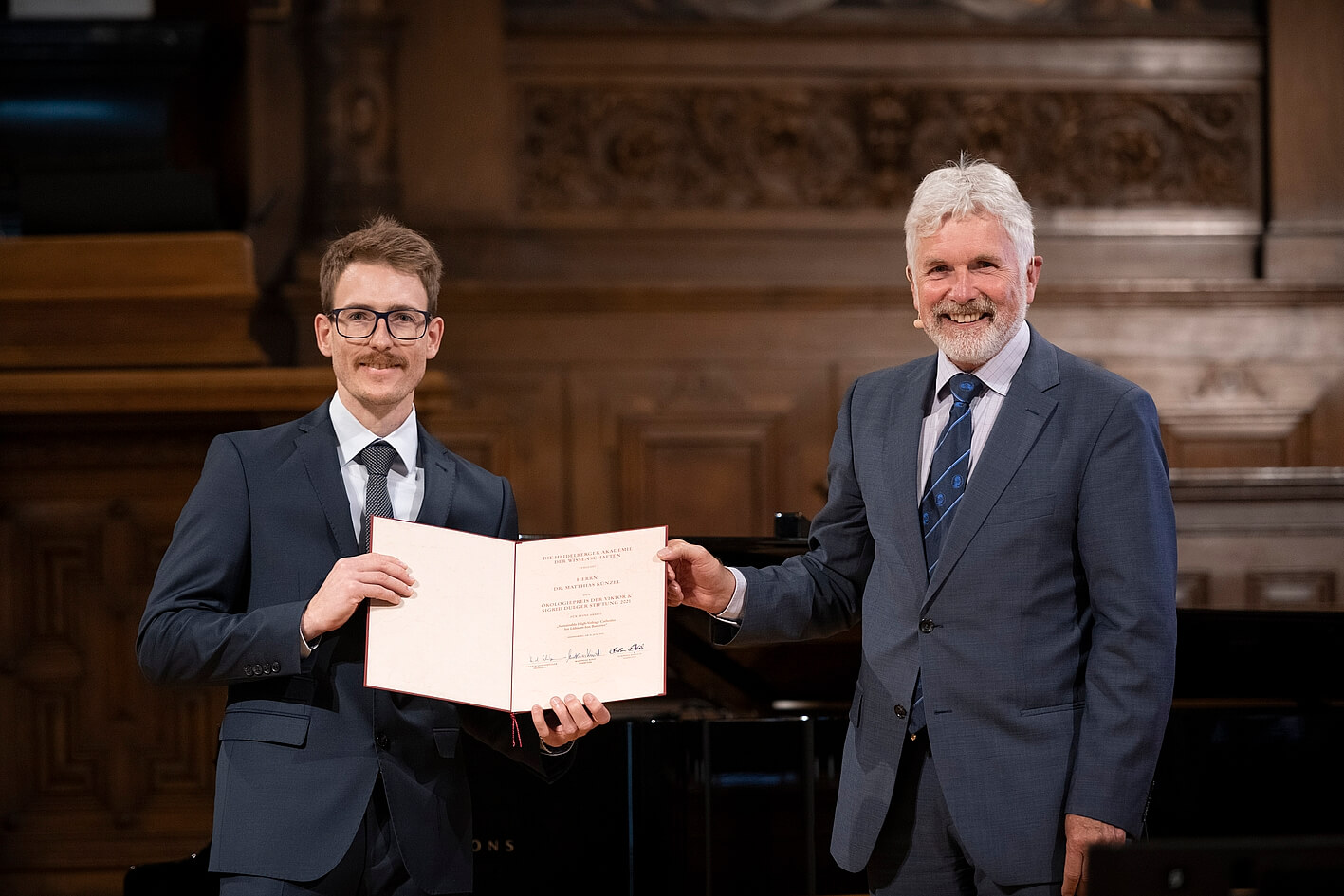
Ecology Prize of the Viktor-und-Sigrid-Dulger Foundation
The Viktor-und-Sigrid-Dulger-Stiftung’s Ecology Prize is intended to promote scientific work in the humanities, social sciences, natural sciences and engineering that deal with environmental problems and their solutions. In 2021 the award went to Künzel. In his excellent work “Sustainable High-Voltage Cathodes for Lithium-Ion Batteries”, he researched the production of sustainable lithium-ion batteries.
In particular, it was about the problem of developing high-voltage lithium-ion cathodes that can do without the critical resource cobalt, as this is not only toxic, expensive and very rare, but also essentially under inhumane conditions in politically unstable regions the world is degraded. In addition, it was possible for this system to replace toxic and environmentally harmful materials such as solvents and fluorinated binders in battery electrode production with water and naturally occurring biomaterials, so that the entire production process will not only be cheaper in the future, but above all more environmentally friendly.
Gips-Schüle Young Talent Award 2021
The Gips-Schüle Foundation promotes research, young talent and teaching in Baden-Württemberg. The focus is on the MINT subjects (mathematics, computer science, natural science and technology) as well as on interdisciplinary projects. In its sphere of activity, Baden-Württemberg, the Stuttgart Foundation works closely with universities and research institutions and enables future-oriented research projects to be carried out.
The reason for the Gips-Schüle Young Talent Award for Dr. Künzel sounds similar to that of the Heidelberg Academy of Sciences: Accordingly, the sustainability of the lithium-ion batteries was also in the foreground.
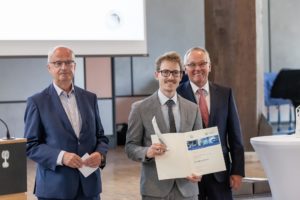
It was also emphasized that Dr. With his work on the implementation of aqueous electrode production techniques for lithium-ion cathodes, Künzel could solve an equally important environmental problem in battery production. It was possible to replace toxic and environmentally harmful materials such as solvents and fluorinated binders in battery electrode production with water and naturally occurring biomaterials, so that the entire production process will not only be cheaper in the future, but above all more environmentally friendly.
In a follow-up project, the Helmholtz Institute Ulm is currently working with its partners on transferring the knowledge gained to production in a pilot line. For this forward-looking research, Dr. Künzel received this year’s award in the technical sciences category.
In the future, Dr. Künzel continues to research the sustainability of lithium-ion batteries with innovative recycling concepts. The aim of the work is that the individual materials can be made directly usable again, instead of simply melting down entire battery cells and recovering only a few valuable metals.
Further Information:
https://www.hadw-bw.de/news/ausgezeichnet-sechs-junge-forschende-erhalten-preise-von-der-akademie
https://www.hadw-bw.de/die-akademiepreise/preisverleihung
https://www.youtube.com/watch?v=9aENDuS_TdY&t=2117s
20.07.2021
Minister of State for Digitization Dorothee Bär (CSU) and member of the Bundestag Ronja Kemmer (CDU) visited the Ulm Battery Exhibition “Akku Alle”. HIU director Prof. Dr. Stefano Passerini guided them through the exhibition and informed them about the latest battery research activities in Ulm and Karlsruhe.
For the first time, the Ulm battery research community (Helmholtz Institute Ulm, Cluster of Excellence POLiS, research platform CELEST, German Aerospace Center, Ulm University, Center for Solar Energy and Hydrogen Research Baden-Württemberg and Karlsruhe Institute of Technology) is jointly organizing an exhibition on sustainability Energy storage and electromobility for the public in the m25 (Münsterplatz 25, Ulm).
Minister of State for Digitalization Dorothee Bär and Member of the Bundestag Ronja Kemmer visited our battery exhibition yesterday.@HelmholtzUlm Director Stefano Passerini guided them through the exhibition and informed them on the battery research activities in Ulm & Karlsruhe. pic.twitter.com/uSh23l3jIu
— POLiS_Cluster (@ClusterPolis) July 21, 2021
The exhibition can still be visited until August 8th, 2021, Tuesday to Sunday from 2 p.m. to 6 p.m.
Further Information
https://www.regio-tv.de/mediathek/video/dorothee-baer-besucht-die-doppelstadt/
July 26th, 2021
Former HIU researcher Dr. Christian Baur was honored with the Ulm Doctoral Prize on the anniversary of Ulm University on July 16, 2021. As the best graduate of the Faculty of Natural Sciences, Baur attended the virtual event live from Copenhagen, where he recently started a new position.
Dr. Christian Baur, who worked for the HIU research group Solid-State Chemistry, completed his doctoral thesis on “Li-rich Disordered Rock Salt Transition Metal Oxyfluorides as Novel Cathode Materials in Lithium-Ion Batteries.” His work was already highly rated (“Mit Auszeichnung”) during his defense by an unanimous vote of the reviewers and examiners.
In his work, Baur carried out fundamental studies on the structure and understanding of the new and promising material class of disordered table salt structures and published his results in 10 articles in international peer-reviewed journals, including high-ranking journals such as Chem. Mater., J. Mater. Chem. A, ACS Materials & amp; Interfaces, The Journal of Phys. Chemistry C and Dalton Transactions.
What distinguished his work, among other things, was the consistent pursuit of demanding questions, for which he always purposefully, independently and creatively looked for the best possible solution. This led to the fact that he was able to inspire international cooperation partners in the field of theory and experiment for his questions and he was able to successfully familiarize himself with the difficult subject of X-ray structure analysis using “total scattering” on powders during a stay of several months at the DTU in Denmark.
His great care paid off, especially when analyzing a large amount of data. The data used by him reflect the changing disorder when loading and unloading the material and provide important information about the general lithium storage mechanism of oxyfluoride materials with disordered table salt structures. As a new class of compounds, these structures are particularly interesting because lithium can be stored in them in a very dense form, with it being surprisingly mobile in the structure, which also manages without the use of cobalt.
Weiterführende Informationen:
https://www.uni-ulm.de/jahrestag2021
https://www.uni-ulm.de/universitaet/hochschulkommunikation/veranstaltungen/jahrestag/54-jahrestag-2021/
https://magazin.minq-media.de/wp-content/uploads/2021/07/Einladung_54Jahrestag_UUlm-1-.pdf
July 2nd to July 11th 2021
A central point for innovation enthusiasts is being set up in the middle of Ulm as part of the Berblinger anniversary. In the summer of 2021 (July 2nd to July 11th, 2021), the city of Ulm, together with Ulm Battery Research Institutes and the Swedish car manufacturer Volvo, invites the public to exchange ideas about mobility and future topics on Hans-und-Sophie-Scholl-Platz.
On the occasion of the 10th anniversary of the Helmholtz Institute Ulm (HIU), numerous HIU scientists will give various lectures on the subject of battery research, innovative energy storage systems and the “future of mobility”. These will be broadcasted externally and via a live stream. The scientific lectures take place just a few hundred meters from the urban M25 exhibition center, in which the exhibition “AKKU ALLE – Energy Storage and Electromobility” takes place.
Venue: Hans-und-Sophie-Scholl-Platz, 89073 Ulm
Organizers: Cultural Department of City of Ulm, Helmholtz Institute Ulm, VOLVO in cooperation with Agency Do it!
Press Release: HIU Scientists present Battery Talks in Ulm City Centre
Series: The Talks shown here may still change slightly.
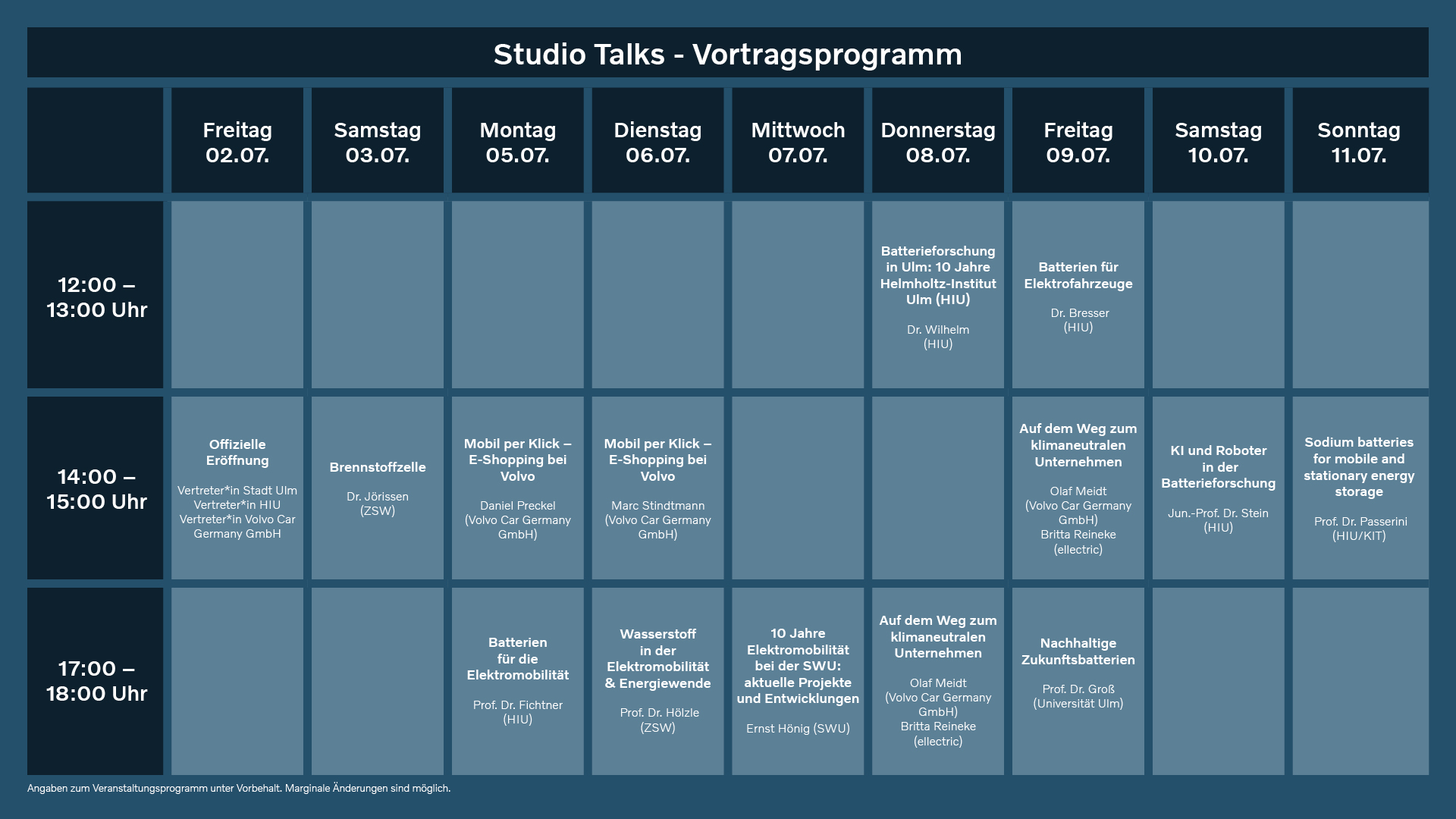
Presentation/Talk: July 3rd, 2021
Research on Fuel Cells
Speaker: Dr. Ludwig Jörissen (Zentrum für Sonnenenergie- und Wasserstoff-Forschung Baden-Württemberg)
Time: 02:00-03:00 PM
Presentation/Talk: July 5th, 2021
Batteries for Electromobility
Speaker: Prof. Dr. Maximilian Fichtner (Helmholtz Institute Ulm)
Topic: The development of batteries for electric vehicles is currently making leaps and bounds. In the lecture, new types of vehicle batteries will be presented, which enable greater ranges with a more sustainable material composition.
Time: 05:00-06:00 PM
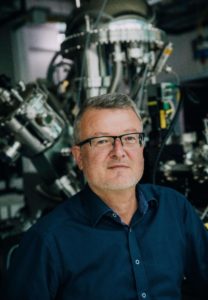
Presentation/Talk: July 6th, 2021
Hydrogen in Electromobility & Energy Transformation
Speaker: Prof. Dr. Markus Hölzle (Zentrum für Sonnenenergie- und Wasserstoff-Forschung Baden-Württemberg)
Topic: How a CO2-neutral Germany can be achieved with green electricity and green hydrogen is highlighted by Prof. Dr. Markus Hölzle (ZSW board member) in his talk. The focus is on the key technologies for the emission-free mobility of the future: lithium-ion batteries and fuel cells.
Time: 05:00-06:00 PM
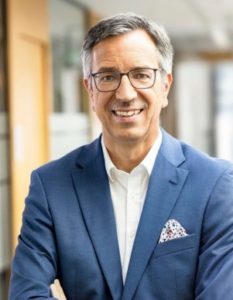
Presentation/Talk: July 7th, 2021
10 years of electromobility at SWU: Current projects and developments
Speaker: Ernst Hönig (SWU)
Topic: Numbers, data, facts, from the pioneering phase to the upcoming mass market. Insight into e-car sharing swu2go and other current projects.
Time: 05:00-06:00 PM
Presentation/Talk: July 8th, 2021
Battery research in Ulm: 10 years of the Helmholtz Institute Ulm (HIU)
Speaker: Dr. Heribert Wilhelm (Helmholtz Institute Ulm)
Topic: High-performance and sustainable batteries are essential for the establishment of electromobility and the success of the energy transition. The fundamentals of the future energy storage devices required for this are being researched at the HIU.
Time: 12:00-01:00 PM
Presentation/Talk: July 9th, 2021
Batteries in Electric Vehicles
Speaker: Dr. Dominic Bresser (Helmholtz Institute Ulm)
Topic: The range, quick charging capability and the price of e-vehicles largely depend on the battery. This lecture offers a general introduction as well as an overview of current and possible future developments.
Time: 12:00-01:00 PM

Presentation/Talk: July 9th, 2021
Sustainale Future Batteries
Speaker: Prof. Dr. Axel Groß (Helmholtz Institute Ulm)
Topic: Sustainable future batteries are based on a chemistry as Li-ion batteries. In the lecture it will be discussed why, despite the existing advantages, they have so far only prevailed selectively.
Time: 05:00-06:00 PM
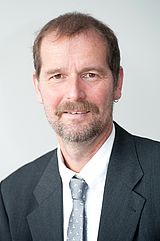
Presentation/Talk: July 10th, 2021
AI and Robots in Battery Research
Speaker: TT-Prof. Dr. Helge Stein (Helmholtz Institute Ulm)
Topic: Battery research is going through digitization and automation towards research 4.0, which enables us to find and understand new materials more quickly.
Time: 02:00-03:00 PM
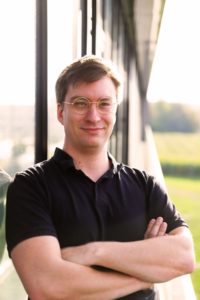
Presentation/Talk: July 11th, 2021
Sodium Ion Batteries (Presentation in English)
Speaker: Prof. Dr. Stefano Passerini (Helmholtz Institute Ulm)
Topic: Sodium batteries are an emerging technology holding the promise to be complementary to lithi-um batteries. They offer enhanced sustainability and lower costs for light-duty vehicles and stationary storage applications.
Time: 02:00-03:00 PM
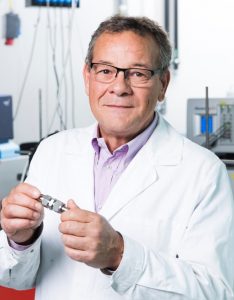
With the “Freedom to Move” mission, Volvo launched a comprehensive initiative and is geared towards its own vision of the future. From the point of view of “personal”, “sustainable” and “safe”, the company develops advanced technology solutions for the mobility of the future. Within the entire life cycle of Volvo vehicles, the CO2 balance is to be reduced by 40% by 2025, and the Volvo Car Group plans to be climate neutral by 2040.
Organizer: Volvo in cooperation with agency “Do it!”, City of Ulm Department of Culture, Helmholtz Institute Ulm
Venue: Volvo Studio Ulm at Hans-und-Sophie-Scholl Platz
Time of Event: July 2nd to 11th, 2021
Opening Times: Tue – Sun from 10 AM to 9 PM
Link: Stadt Ulm – Berblinger Jubiläum
Link: Volvo Studio Ulm
08.06.2021
Berblinger Anniversary: Battery Exhibition „AKKU ALLE!?“
Opening Ceremony on June 8th, 2021
On June 8th, 2021 the Mayor of Ulm Gunter Czisch (CDU) and Deputy HIU Director Prof. Maximilian Fichtner opened the AKKU ALLE exhibition in front of the press. Before taking a short tour, Fichtner explained: “We see batteries are becoming increasingly important in various areas of life. From electromobility to solar storage systems in our homes. There are many facts and myths about battery applications. We think it is time to clarify some of these aspects that are around. ”
From Wednesday, the exhibition at Münsterplatz 25 in Ulm is open to the public. It is open daily (Tue-Sun) from 2 p.m. to 6 p.m. The last day of the exhibition is August 8th, 2021.
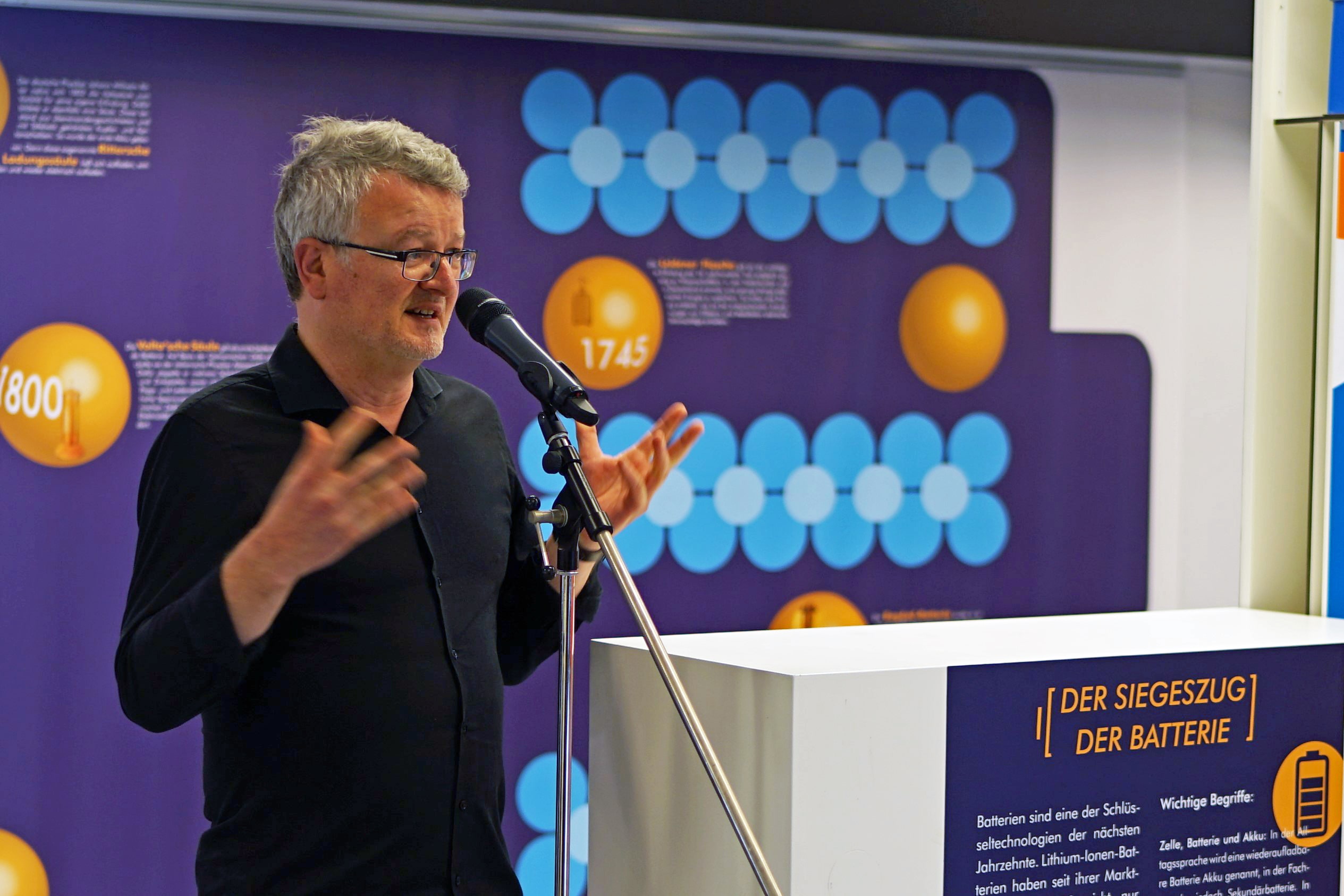
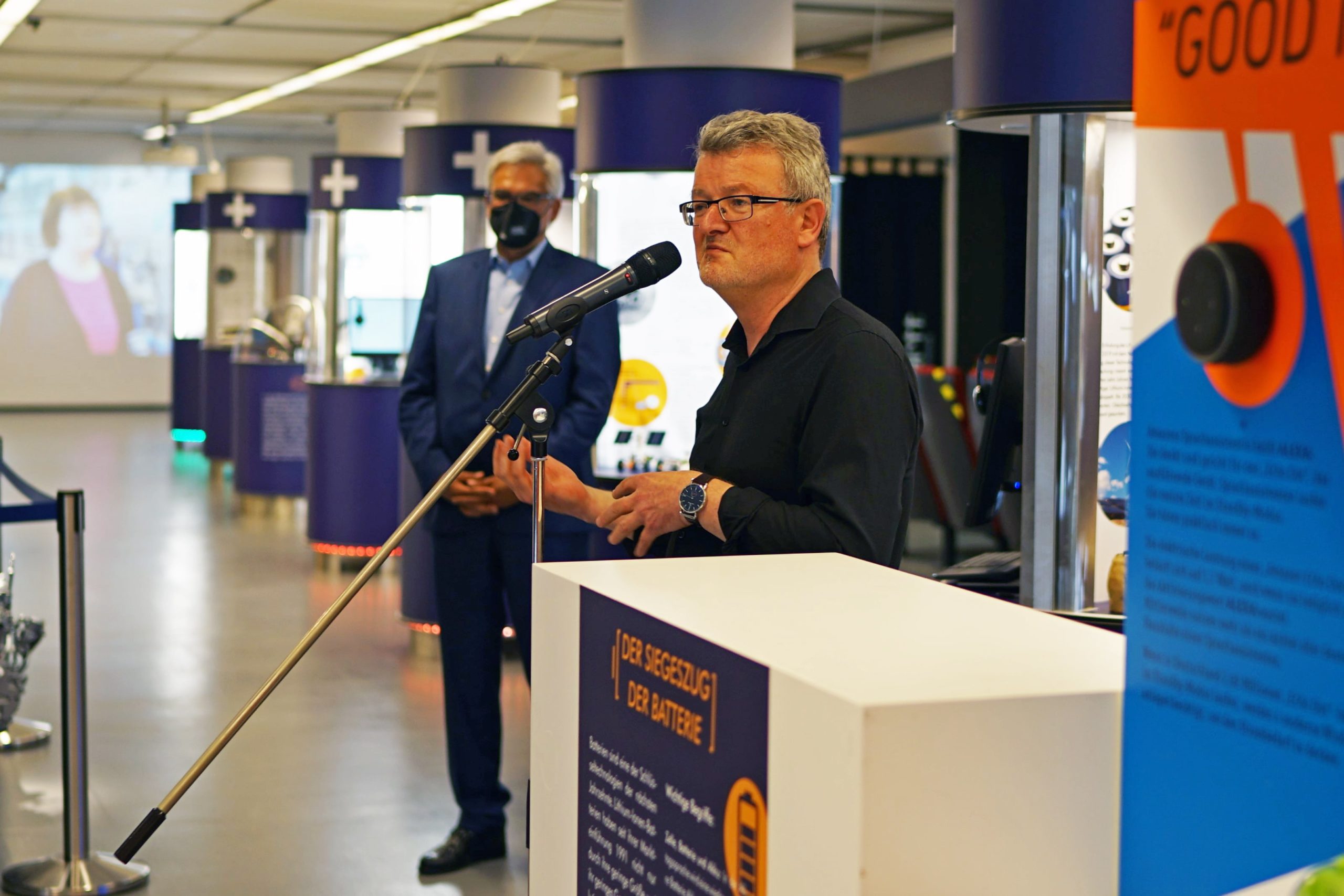
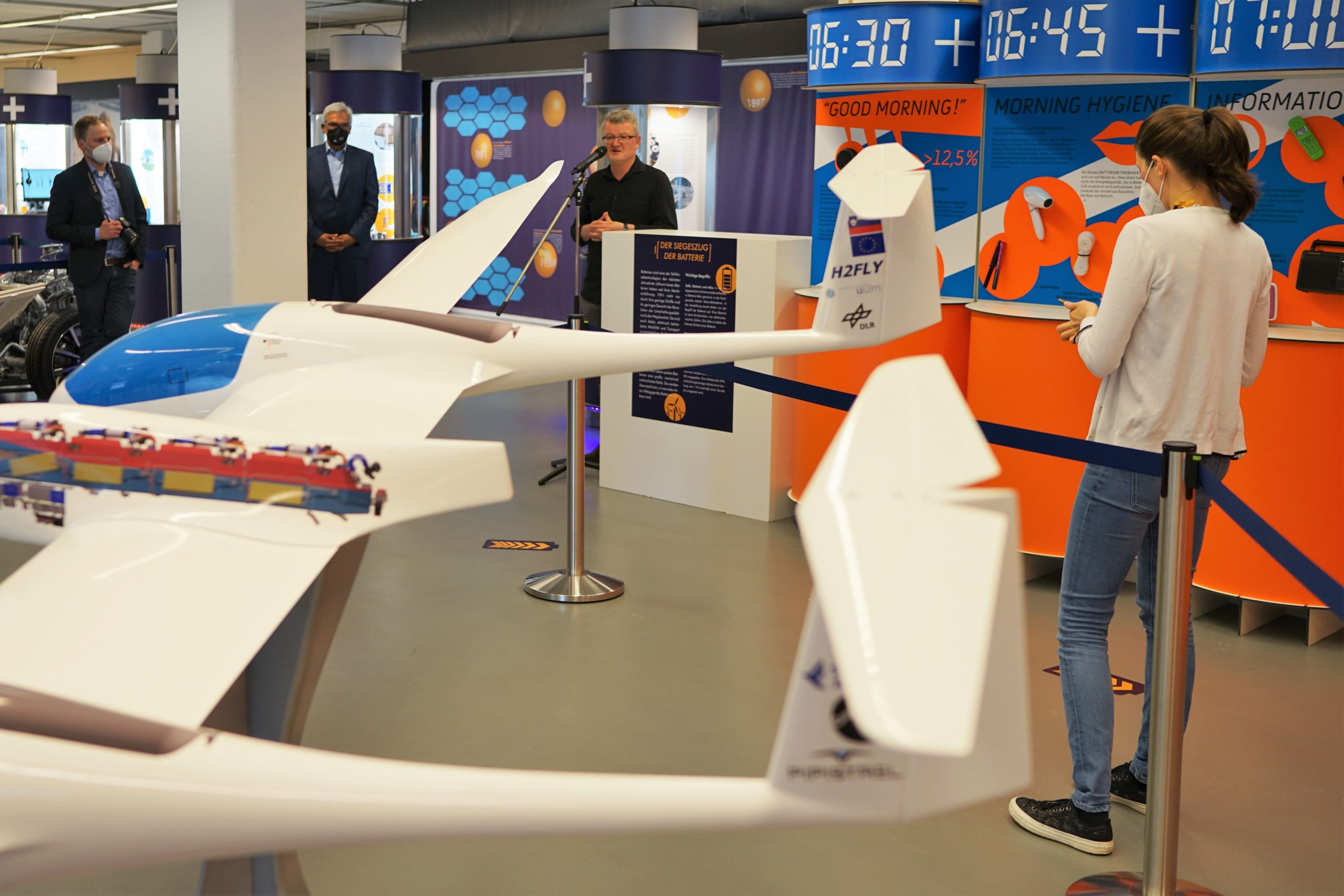
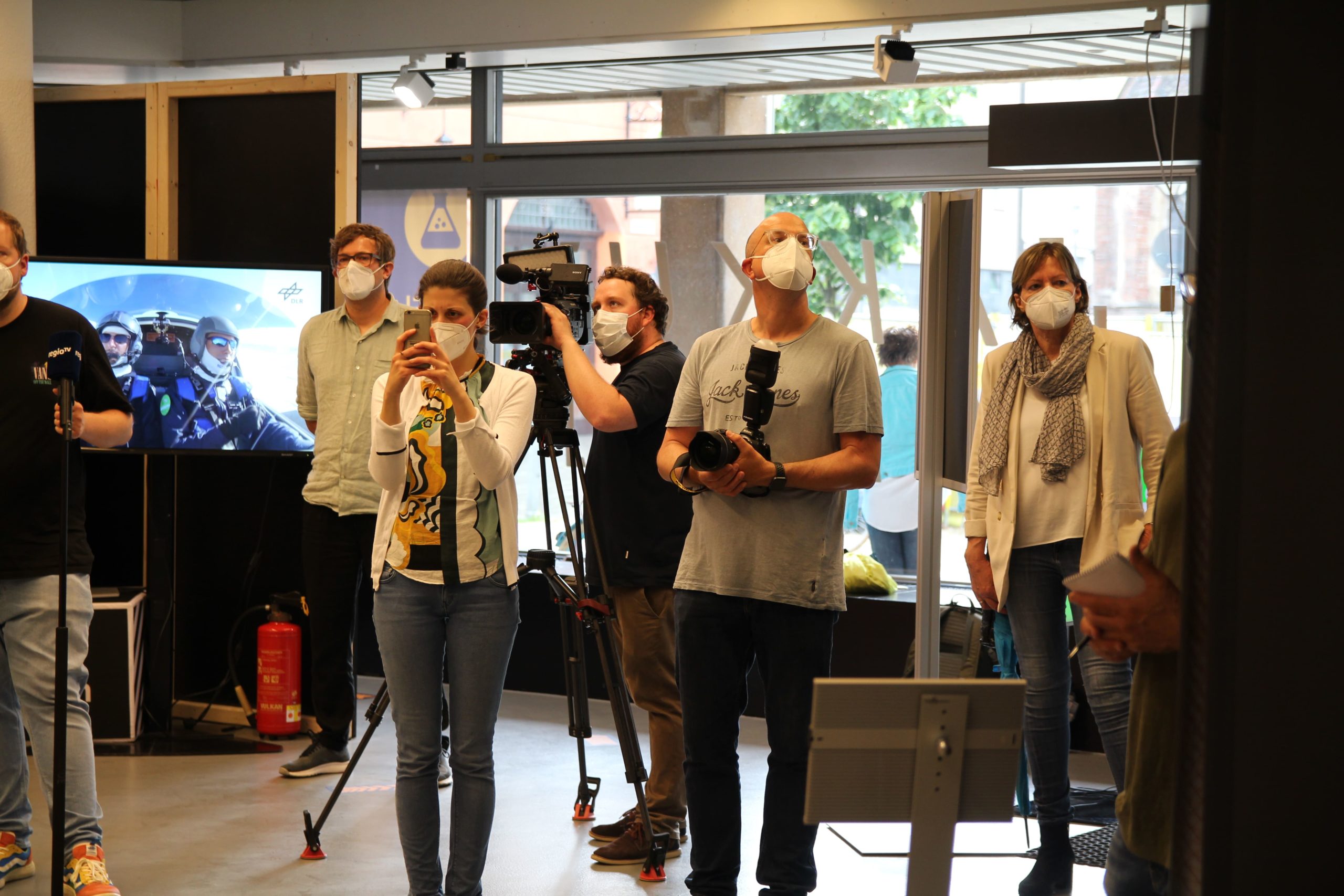
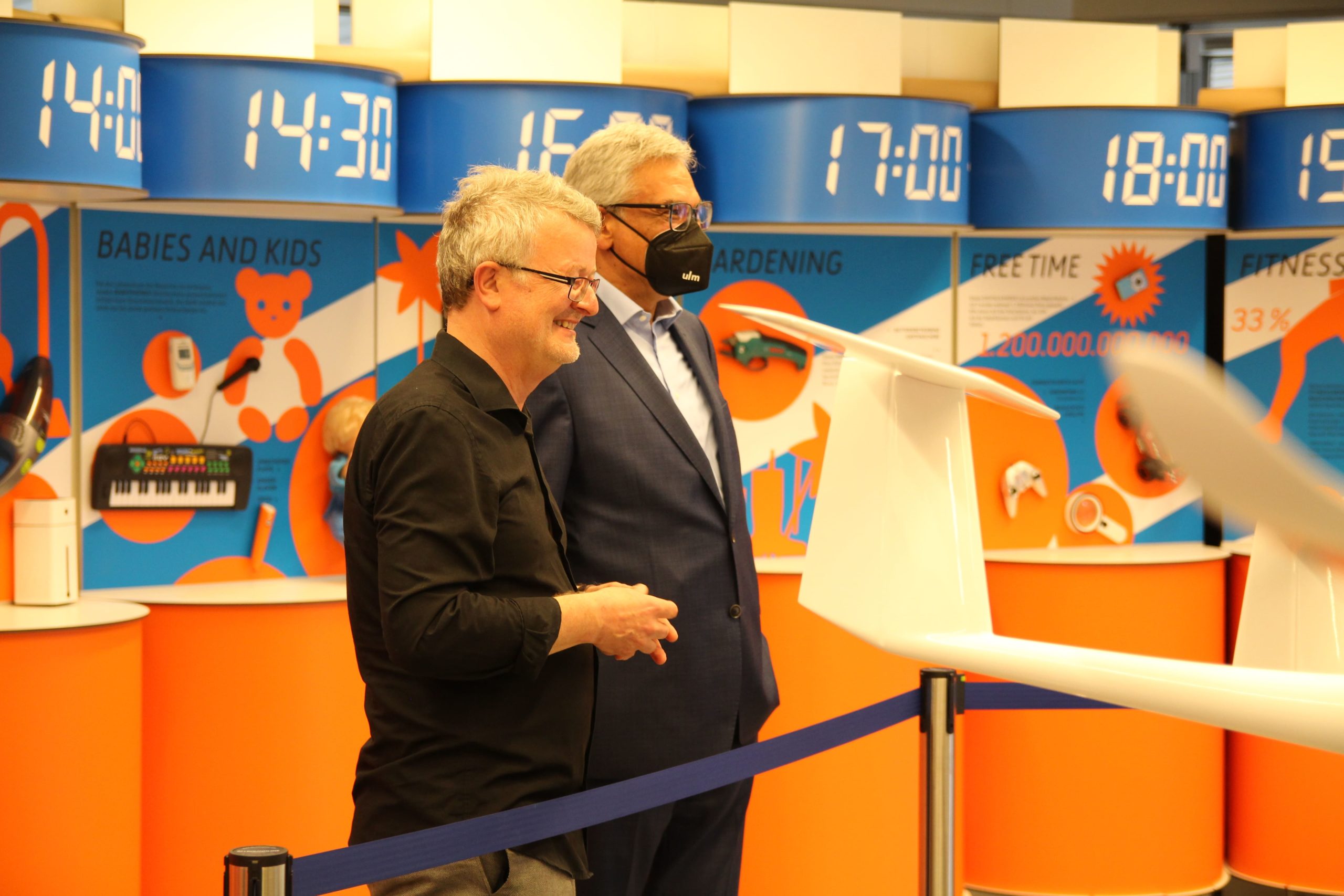
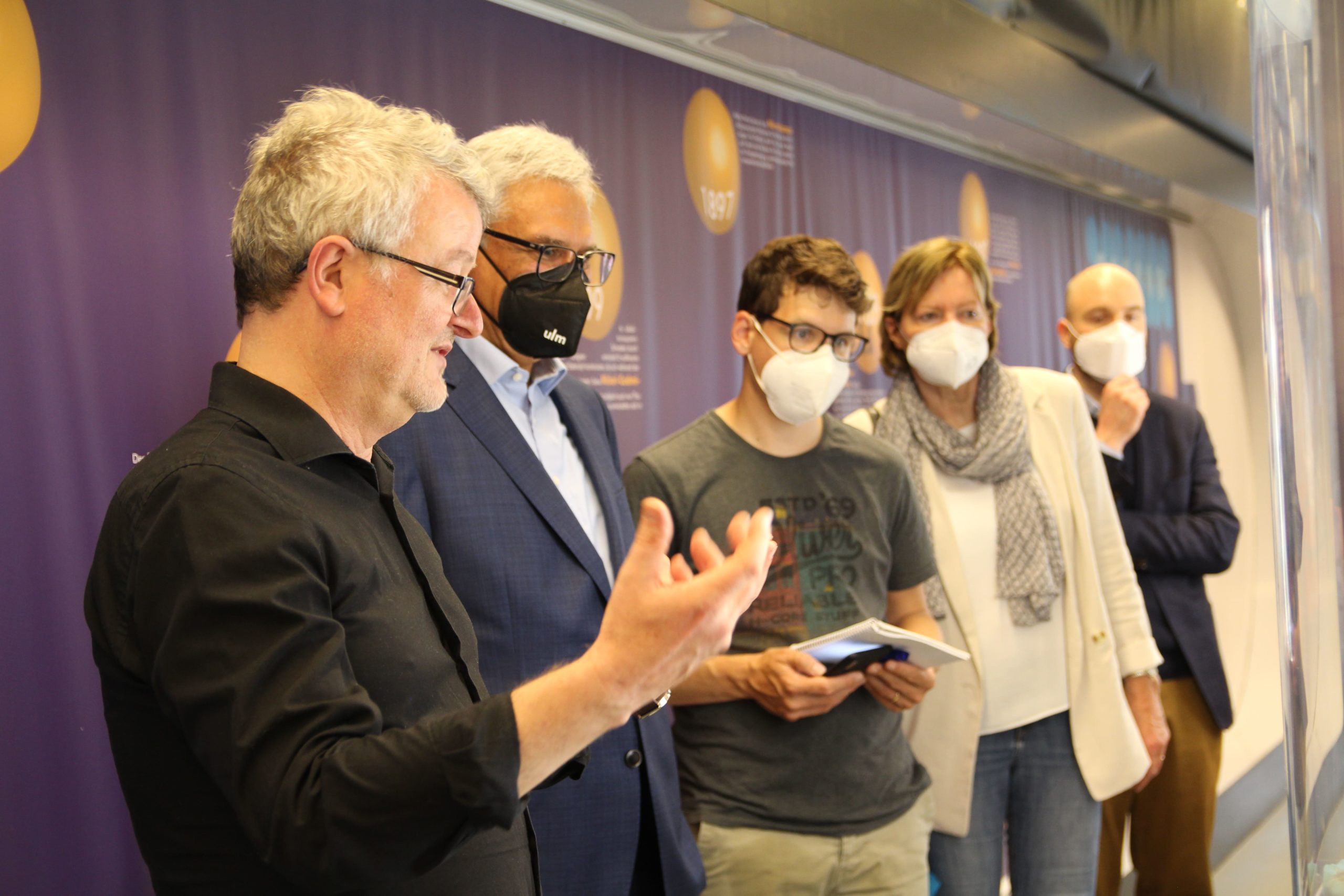
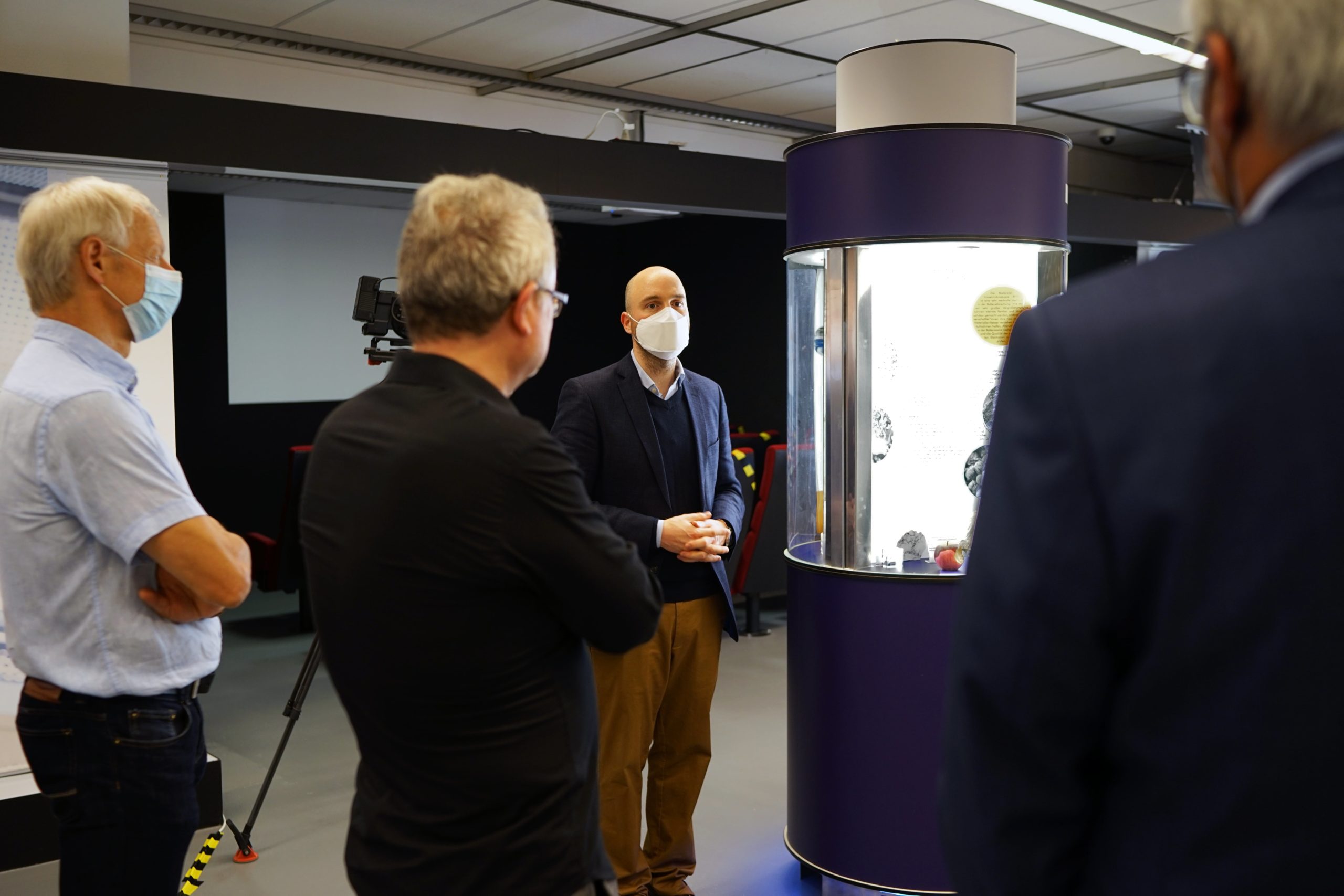
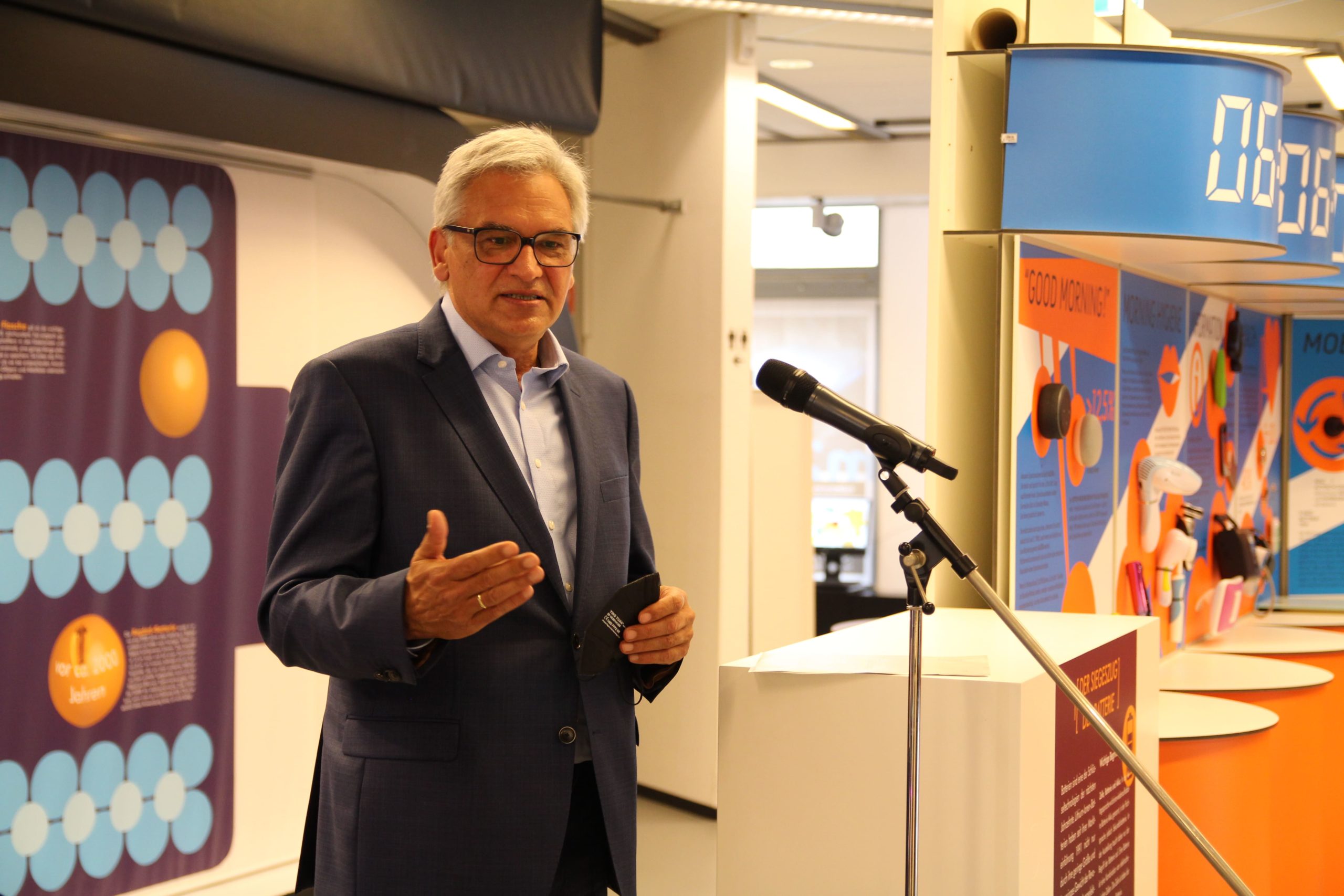
All photos of press event (08.06.2021)
We opened our battery and fuel cell exhibition in Ulm with the mayor & @MaxFichtner. “We want to inform people about the facts of these technologies. You often find in social media discussions that knowledge from 10 years ago is brought forth there,” said Maximilian Fichtner(1/2) pic.twitter.com/xPBXeRgvu6
— POLiS_Cluster (@ClusterPolis) June 9, 2021
Official press text of battery exhibition AKKU ALLE
The corona virus has changed our lives – many dreams have burst, people’s daily routines ended abruptly. At the same time, there are also winners in this crisis: automobile companies are currently conquering an undreamt-of growth market. E-cars are more popular than ever. Manufacturers of electrical appliances cannot sue either. In times of home office, demand also grows for smartphones and laptops.
Therefore, the Ulm Battery Research Institutes raise the question somewhat provocatively: “AKKU ALLE?!” (engl.: “Low Battery?”). The battery business is booming. At the same time, battery researchers in Ulm are faced with the challenge of batteries having to deliver what they promise: a climate-friendly energy supply and electromobility for all of us. This requires sustainable battery materials, some of which have yet to be invented.
These future batteries are being researched in Ulm. For the first time, the Ulm battery research institutes (Helmholtz Institute Ulm, Cluster of Excellence POLiS, research platform CELEST, German Aerospace Center, University of Ulm, Center for Solar Energy and Hydrogen Research Baden-Württemberg and Karlsruhe Institute of Technology) is jointly organizing an exhibition on sustainable energy storage and electromobility for the public in the m25 (Münsterplatz 25).
In the “AKKU ALLE” exhibition, over 100 battery-operated exhibits from everyday life can be seen. Absolute highlights of the exhibition: In a “blackout” simulation for Ulm in 2029, a six-day power failure in the Danube-Iller region will be simulated. In addition, top-class exhibits from industry and science are on display. Also included: a large-format e-car module by Volvo, a hydrogen plane, a home storage system and over 100 individual exhibits from everyday life. The visitors will be amazed where batteries are hidden nowadays.
AKKU ALLE Battery Exhibition
Where? M25, Münsterplatz 25, 89073 Ulm
When? Daily (Tue-Sun) from 2-6 p.m.; June 9th until August 8th 2021
COVID19-Restrictions? A self test kit, a double vaccination certificate („Impfpass“) or recovery certificate is your ticket into AKKU ALLE.
Entrance Fee? No.
Further Links
https://www.regio-tv.de/mediathek/video/akku-alle-ausstellung-zur-batterie-forschung-im-m25/
https://ulm.freiewaehler.de/ausstellung-akku-alle-m25-ulm/
https://berblinger.ulm.de/programm/ausstellungen/akku-alle
Press Contacts:
Sebastian Huber
City of Ulm, Cultural Department
Frauenstrasse 19, 89073 Ulm
Phone: +49 (0731) 161 4710
Email: s.huber@ulm.de
Patrick von Rosen
Helmholtz Institute Ulm (HIU)
Helmholtzstrasse 11, 89081 Ulm
Phone: +49 (0731) 50 34013
E-Mail: patrick.rosen@kit.edu
April to October 2021
Exactly 10 years ago, in 2011, the Helmholtz Institute Ulm (HIU) was founded. Since then, top international research of electrochemical cell developments of the next generation have been taking place at the HIU. Since then, the international team of around 130 scientists has been researching the further development of the fundamentals of sustainable energy storage systems for stationary and mobile use.
This year, HIU does not only celebrate its own 10th birthday. Its namesake, Hermann von Helmholtz, will also be celebrated: in 2021 he would have been 200 years old. The HIU accompanies these two occasions with a broad program of celebrations and events.
Program of events: Anniversary celebrations 10 years of HIU
April 15 to August 8, 2021 (extension may be possible)
Battery exhibition AKKU ALLE (Link, press release)
Venue: M25 exhibition, Münsterplatz 25, 89073 Ulm
Opening times: Daily from 2.00 PM to 6.00 PM., Tuesday to Sunday
02. April bis 11. Juli 2021
Scientific Battery Talks at Downtown Ulm VOLVO Forum (Link, Press Release)
Scientists from the HIU present their research, all lectures are streamed live. The lectures will be made available to a smaller audience on site.
Venue: Hans-und-Sophie-Scholl-Platz, 89073 Ulm
Times: daily lecture by a HIU researcher
September 15 to September 16, 2021
Conference for all HIU researchers from Karlsruhe and Ulm
Venue: Room N27 (Ulm University) and Helmholtz Institute Ulm, Helmholtzstrasse 11, 89081 Ulm
Times: 09.00 AM until 7.30 PM
September 17, 2021
Anniversary celebration: 10 years of HIU
Program highlight, invitation of selected, top-class guests from politics, science, industry and the media.
Venue: Helmholtz Institute Ulm, Helmholtzstrasse 11, 89081 Ulm
Time: 10.00 AM until 1.00 PM
September 18, 2021
Open Day at HIU (2021)
Public event: Get to know the HIU on the Ulm Eselsberg. Laboratory tour, food trucks, reading of Ulm murder mystery, information events.
Venue: Helmholtz Institute Ulm, Helmholtzstrasse 11, 89081 Ulm
Time: 10.00 AM until 6.00 PM
October 4th to October 5th, 2021
ZEISS Science truck at the HIU
Student information event organized by the HIU and ZEISS: Innovative laboratory equipment (microscopes) are exhibited and presented inside a walk-in truck.
Venue: Helmholtz Institute Ulm, Helmholtzstrasse 11, 89081 Ulm
Times: 10.00 AM until 6.00 PM